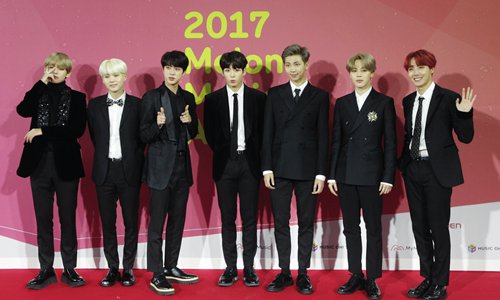

South Korean girl group and idols Red Velvet Photo: IC
According to Rita, 18, a sophomore in agricultural studies, being a fan of a Korean idol is not something to be proud of among the youth right now.
Rita said she sometimes comes across people, especially those from other fan communities, who look down upon fans of Korean idols, and many of her friends do not understand why she is so into them.
”My idol group did well in 2017, and some of us are so proud that they posted a lot of comments about their love for the group, which triggered mockery and even attacks from net users and fans of other types of music or idols from other countries,” she said.
Starting in 2016, anti-South Korean sentiment grew among a large number of Chinese, especially in the past year, due to South Korea’s decision to deploy the Terminal High Altitude Area Defense (THAAD) missile defense system. With voices of boycotting South Korean brands, products and cultural influence going strong among the people, the fan community in China has also been affected, causing disputes online.
”My idol never disrespects my country. I love him because this person has a positive impact on me,” she said.
Rita fully trusts that her idol is a decent young man who would never do or say anything that disrespects China. ”But if he does, I’ll probably be so angry that I won’t like him anymore.”
Still, fans have noticed a decreased number of productions and visits of South Korean artists in 2016, and there has been a rumored unofficial ban against broadcasts and activities of South Korean entertainment.
Over the past year, South Korean pop culture, which reached its peak between 2012 and 2015, has gone downhill in China. But many wonder if it will make a comeback soon.
South Korean President Moon Jae-in paid a state visit to China from December 13 to 16, 2017, and Sino-South Korean ties are predicted to progress. During the visit, South Korean celebrities including members of idol group EXO and actress Song Hye-gyo attended cultural and economic forums, which have been seen as a sign of progress for cultural acceptance by many fans concerned with the topic.
Several South Korean pop culture fans spoke with the Metropolitan about whether there is a conflict between being a fan and being a patriot and if they think that South Korean stars might make a comeback in China.

A new generation of South Korean idol groups like the BTS has a large fan base in China. Photo: IC

A new generation of South Korean idol groups like the BTS has a large fan base in China. Photo: IC
Fans caught in disputes
As a popular phrase used frequently on social media in 2016 goes, ”National interests come before idols.”
”It’s rational, but also a bit immature. Of course, it’s the right thing for a fan to give up on foreign celebrities that they love because of their country. It’s the only way that they can show their patriotic sentiment,” said Zhang Aixi, 25, a graduate student in communications.
She said she will stop being a fan if her idols say anything against her country, which she believes will not happen. ”Chinese fans have the money, so they won’t.”
Zhang has been into South Korean pop culture for over 10 years. She loves BTS (Bangtan Sonyeon Dan, which means ”Bulletproof Boy Scouts”), a seven-member boy group who debuted in 2013. She goes to their concerts and has bought all of their albums. But, most of her time is spent on social media.
Many of her answers, which explain things about the group’s music and the member’s personalities, on the knowledge-sharing site Zhihu get thousands of likes. But sometimes fans like Zhang become targets of patriotic sentiment.
Patriotic sentiment leads people to declare war against certain fan clubs, and they flood their forums with abusive messages.
Zhang says these attacks do not last long. ”There will always be an anti-South Korean sentiment in the country, but people’s focus might shift from South Korea [to other countries],” she said.
The confrontation on social media is not limited to people against South Korean fandom, but also spreads to people within the fan community.
The community of South Korean celebrity fans is often seen by the public to be young girls who spend unnecessary amounts of money on their idols and go crazy about everything the idol does. Zhang said she is too old for online fights, but for those who come to social media pages to pick a fight, she fights back.
”However, having young fans shows the popularity of the idol. After all, young people have the final say in what’s popular and what’s not,” she said.
Becoming a better person
Rita deals with the loneliness of being an overseas student in the US by being a fan of Kim Tae-hyung, a member of BTS.
She spends four to five hours on Weibo, YouTube or other sites for updates on news, discussions and films related to the group. She rarely eats without watching reality shows about her idols.
To support her idol, Rita spends a lot of time raising money, which is used in celebrating her idol’s birthday, buying albums to boost sales and rankings, and paying for advertisements to raise his fame. She also does charity work in his name as well, and she adopted 23 tigers in a zoo because his nickname is the little tiger and he is 23 years old.
Rita became a fan at the end of July, but she has spent more than 100,000 yuan ($15,400) supporting her idol.
She sees herself as a ”typical bad kid who spends lots of time and money chasing after idols.”
But she believes that those young men changed her.
”It all started with their good looks, but it’s their personalities that keep me a fan,” she said. ”He looks at things from an angle that is different from most of us, almost child-like. He describes things in a powerful and unconstrained style.”
Compared to the previous generations of idols who kept their distance, the new stars are more down-to-earth. They go on reality shows and are active on social networking sites so that fans feel close to them.
”The members share their lives on Twitter almost every day. There are many ways you can get to know them,” Rita said. ”He makes me feel like I am more than merely a fan of an idol who lives on a screen.”
”I used to be aloof and indifferent. Being one of their fans has brought a positive impact on my life,” she said.
She plans to go to South Korea for a concert or a fan meeting during her spring break or on her summer vacation.
Changing trends
Among fans of Korean celebrities, there are comparatively fewer men than women.
Zhou Haoyan, 20, a college student in Beijing, rarely talks about his love for South Korean girl groups in real life because it’s ”unnecessary.”
Zhou has been following female idol groups such as Girls’ Generation and Red Velvet for the last four years or so. He follows almost all the idols and groups by South Korean entertainment agency S.M. Entertainment, which made big plans in the Chinese mainland in 2016, according to Zhou.
He was disappointed when he saw that many of the projects, including TV series, films, music production and concert broadcasts, said to be in co-production by companies from the two countries, were not produced or broadcasted in 2016 as the companies had announced. However, he thinks it makes sense.
”In recent years, the South Korean entertainment industry has played a big role in China. [Chinese companies] bought copyrights to South Korean TV shows and a lot of artists came to China. In the face of political conflict between the two countries, there should be sanctions. I can see that China is increasing its efforts in cultural communication and publicity.”
It could lead to young people, who are not diehard fans of South Korean pop culture, to start turning to emerging Chinese idols, according to Zhou.
”Times have changed. The Chinese entertainment market previously knew nothing about the concept of an ’idol,’” he said, adding that public attention is captured by local idols like the TFBOYS and SNH48 and to many of the returnees like Victoria Song and Kris Wu, who trained in South Korea and came back for a career in China.
However, Zhou is optimistic about the future of South Korean pop culture in China.
”There could be fewer restrictions than in 2017. Cooperation in tourism is already returning. After all, the two countries are geographically close and it’s impossible not to engage in some economic and cultural cooperation.”
He is counting on the South Korean agencies to make efforts to come back. ”After all, among China, Japan and South Korea, the Chinese market is comparatively younger, therefore easier to make progress in. They will also try to develop in South Asian countries, but the market there is not as big.”
Zhang agrees. ”I feel that Korean agencies will spare some of their efforts on the Chinese market and use them in other overseas markets.”
Rita points out that it is important that the agencies manage the issues carefully and systematically, such as staying away from releasing entertaining updates during sensitive times.
”But I don’t think Korean pop culture could go back to how hot it was in 2015 in China,” Zhou said.
Newspaper headline: Caught in the middle
Se artikeln här:
Källa: As Sino-South Korean ties progress, will pop culture from this country make a …

Lämna ett svar